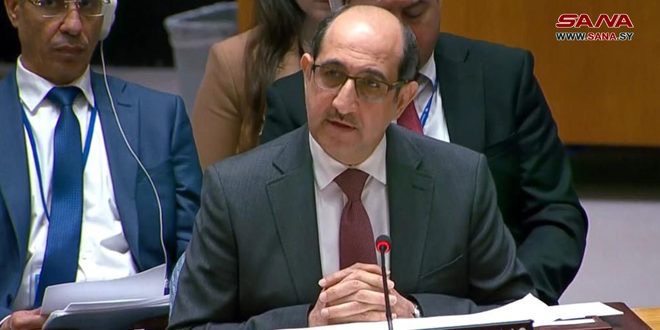Ambassador Sabbagh: The States parties to CWC responsible for correcting the deviation of the OPCW’S Technical Secretariat regarding the chemical file in Syria
On May 8th, Syria’s Permanent Representative to the United Nations Bassam Sabbagh affirmed that the states parties to the Chemical Weapon Convention (CWC) shoulder responsibility for correcting the deviation of the Technical Secretariat of the Organization of the Prohibition of Chemical Weapons (OPCW) from its technical and neutral path set for it by th CWC, and ending its biased and unprofessional dealing with the “chemical file” in Syria.
During a session of the Security Council on Monday on the “chemical file” in Syria, Sabbagh reiterated Syria’s condemnation of the use of chemical weapons at any time, any place and by anyone and under any circumstances.
Sabbagh stressed that Syria affirms its full and transparent cooperation with the OPCW and its commitment to implementing all its obligations under the convention.
Sabbagh indicated that Syria in 2013 made a strategic decision to join the Chemical Weapons Convention and showed immediate commitment to its implementation.
Sabbagh explained that the Syrian National Committee submitted its 112th monthly report on the 15th of March and the 113th on the 15th of April, related to the implementation of the decision of the Executive Council of the OPCW on the 15th of November 2013.
Sabbagh pointed out that a mini-team of the Declaration Evaluation Team visited Syria twice this year, the first between January 17 and 22, and the second between April 12 and 19, during which the Syrian National Committee provided all the necessary facilities for the success of the team’s work, as was done during the two visits.
Sabbagh said that making these two visits by the mini-team, which is the same team for evaluating the declaration, without the expert that the technical secretariat of the organization insists on sending, and carrying out all the activities that the team for evaluating the declaration was doing during all the previous 24 rounds of consultations, actually equals the holding of the 25th and 26th rounds of consultations.
Regarding the inspection activities at the facility of the Center for Scientific Studies and Research, Sabbagh noted that last March, the report of the inspection team was issued on its ninth round that it conducted last September, which indicates Syria’s cooperation and the inspection team’s ability to implement the objectives assigned to it. It was clear that there wasn’t any activities that violate the agreement.
He added that unfortunately, the monthly report of the Director General of the OPCW did not refer to the results of the report of this round, nor to the results of the report of the inspection team in the eighth round.
The Technical Secretariat does not address these results although they reflect full cooperation by Syria with this team on the one hand, and not violate the convention on the other hand.
Sabbagh pointed out that Syria welcomed the holding of high-level consultations between the Minister of Foreign Affairs and Expatriates, the “Chairman of the Syrian National Committee,” and the Director General of the Organization for the Prohibition of Chemical Weapons, and it looks forward with interest to holding them as soon as possible after an agreement on its agenda.
Sabbagh indicated that despite Syria’s constant emphasis on the need for the “fact-finding mission” to reform its working methods, address the serious defects in it and make its reports professional and impartial, it continued to cooperate with this mission, received its teams and provided them with all possible facilities and assistance to make their mission a success, and it is still waiting for the issuance of the reports of the Fact-Finding Mission on the reported incidents.
Sabbagh added that the Chemical Weapons Convention was drafted, like other international agreements, on the basis of a delicate balance between the rights and obligations of the states parties to it. Therefore the claim of some countries that Syria is not committed to the convention at a time when they worked to rob Syria of the rights and privileges of its membership as a state party to the Convention, contradicts the balance between rights and obligations dedicated by the Convention.
Sabbagh stressed that Syria will continue to work openly with the OPCW, despite the biased and unprofessional handling of its technical secretariat with the Syrian case and its deviation from the technical and neutral path set for it by the Chemical Weapons Convention.
Sabbagh noted that the states parties to the CWC are responsibile for correcting this deviation so that the technical secretariat returns as it was in the past, a fair tool for the implementation of the Convention.
al-Mohammad/ Inas Abdulkareem

